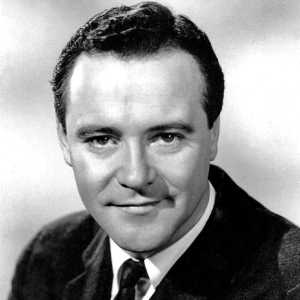John Uhler Lemmon III (February 8, 1925 – June 27, 2001) was an American actor. Considered equally proficient in both dramatic and comic roles, Lemmon was known for his anxious, middle-class everyman screen persona in dramedy pictures, leading The Guardian to coin him "the most successful tragi-comedian of his age."
He starred in over sixty films and was nominated for an Academy Award eight times, winning twice, and received many other accolades, including six Golden Globe Awards (counting the honorary Cecil B. DeMille Award), two Cannes Film Festival Awards, two Volpi Cups, one Silver Bear, three BAFTA Awards, and two Emmy Awards. In 1988, he was awarded the American Film Institute's Lifetime Achievement Award for his contributions to the American cinema.
His best known films include Mister Roberts (1955, for which he won the year's Oscar for Best Supporting Actor), Some Like It Hot (1959), The Apartment (1960), Days of Wine and Roses (1962), Irma la Douce (1963), The Great Race (1965), Save the Tiger (1973, for which he won Best Actor), The China Syndrome (1979), Missing (1982), and Glengarry Glen Ross (1992). He also acted in several Broadway plays, earning Tony Award nominations for Tribute and the 1986 revival of Long Day's Journey into Night.
Lemmon had a long-running collaboration with actor and real-life friend Walter Matthau, which The New York Times called "one of Hollywood's most successful pairings," that spanned ten films between 1966 and 1998; The Fortune Cookie (1966), The Odd Couple (1968) and its sequel The Odd Couple II (1998), The Front Page (1974), Buddy Buddy (1981), JFK (1991), Grumpy Old Men (1993) and its sequel Grumpier Old Men (1995), The Grass Harp (1995), and Out to Sea (1997).
Early life and education
Lemmon was born on February 8, 1925, in an elevator at Newton-Wellesley Hospital in Newton, Massachusetts. He was the only child of Mildred Burgess (née LaRue; 1896–1967) and John Uhler Lemmon II (1893–1962), who rose to Vice-President of Sales of the Doughnut Corporation of America. John Uhler Lemmon II was of Irish heritage, and Jack Lemmon was raised Catholic. His parents had a difficult marriage, and separated permanently when Lemmon was 18, but never divorced. He attended John Ward Elementary School in Newton and the Rivers School in Weston, Massachusetts. Often unwell as a child, Lemmon had three significant operations on his ears before he turned 10. He had spent two years in hospital by the time he turned 12.
During his acceptance of his lifetime achievement award, he stated that he knew he wanted to be an actor from the age of eight. He began to act in school productions. Lemmon attended Rivers Country Day School and Phillips Andover Academy (Class of 1943), where he pursued track sports with success, and Harvard College (Class of 1947), where he lived in Eliot House. At Harvard, he was president of the Hasty Pudding Club and vice president of Dramatic and Delphic Clubs. Except for drama and music, however, he was an unexceptional student.
Forbidden to act onstage due to academic probation, Lemmon broke Harvard rules to appear in roles using pseudonyms such as Timothy Orange.
A member of the V-12 Navy College Training Program, Lemmon was commissioned by the United States Navy, serving briefly as an ensign on the aircraft carrier USS Lake Champlain during World War II before returning to Harvard after completing his military service. After graduation with a degree in War Service Sciences in 1947, he studied acting under coach Uta Hagen at HB Studio in New York City. He was also a pianist, who became devoted to the instrument at age 14 and learned to play by ear. For about a year in New York City, he worked unpaid as a waiter and master of ceremonies at the Old Knick bar on Second Avenue. He also played the piano at the venue.
